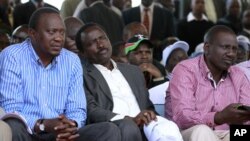The Hague-based International Criminal Court is expected to rule next week on whether the cases of six suspects accused of masterminding Kenya’s 2007-2008 post-election violence will proceed to trial. The charges will have far-reaching impact on the country’s upcoming elections.
Two of the six suspects, Deputy Prime Minister Uhuru Ruling and former agriculture minister William Ruto, have announced they will run for president in Kenya’s upcoming elections, the exact date of which is still unknown.
Kenyatta, who is also minister of finance, and Ruto are charged with being criminally responsible as indirect co-perpetrators for crimes against humanity. In Kenyatta’s case, the crimes against humanity are murder, forcible transfer, rape, persecution, and other inhumane acts; for Ruto, murder, forcible transfer of population, and persecution.
They and the other four suspects will know their fate January 23, when the ICC hearing begins.
Law Society of Kenya Chairman Kenneth Akide says Kenyan law allows Kenyatta and Ruto to compete in the elections, saying the two are presumed innocent until proven guilty. But, he says, the traumatic events following the last elections and subsequent suffering are still fresh in many peoples’ minds.
"You can imagine a candidate with such a baggage trying to run [for] office," he said. "Even without an ICC conviction, even as we wait for the ICC to conduct a trial, they face really a very, very uphill task in convincing voters. If you are running for president, and you are also having to spend time to travel to The Hague to present your defense, and all this is being reported and being reported very closely, that really presents a very, very difficult time.”
He says he thinks most voters will assume that there may be something to the charges, and that the public will presume guilt until innocence is proven if the ICC takes the cases to trial.
But Victor Rateng, project manager for public opinion surveys at the polling firm Ipsos-Synovate, disagrees. He says in a July 2011 poll, only 56 percent of Kenyans surveyed supported the ICC process.
Rateng says that support was especially low in Central Province, Kenyatta's home territory, and the Rift Valley, Ruto’s home constituency.
Rateng says he thinks if the ICC does not take the cases to trial, Kenyatta and Ruto can use that to boost their popularity and credibility in their campaigns.
But if the trials proceed, he says all is not lost. He notes how Kenyatta and Ruto told their supporters that the ICC had been “politicized” and manipulated.
"That was one of the key things that they used to campaign against their political rivals and saying, yes, there is collusion between our rivals and the ICC to have us prosecuted so that they can have the presidency in 2012," he said.
National Council of Non-Governmental Organizations Chairman George Wainaina says he thinks the average villager in Central Kenya and the Rift Valley feels that their candidate has been victimized by their rivals through the ICC process, and that the candidates stood up for their ethnic groups during the violence.
"To them, they will probably support the people in ICC rather than vote for somebody else," hesaid. "Look at the person in the village who is told, 'the Kikuyus took your land,' who is told, 'the Kalenjins were killing your people.'"
Wainaina says he thinks the ICC charges and possible trials are a deterrent to anyone who wants to repeat what happened in the last elections.
Kenya erupted in ethnic violence following the bitterly-disputed 2007 presidential poll. More than 300,000 people were displaced in the violence, and some 1,300 others killed.
With the help of mediator and former U.N. chief Kofi Annan, presidential rivals Mwai Kibaki and Ralia Odinga forged a power-sharing government that has held together despite recurring tensions. Odinga, who is now prime minister, has declared that he will run for president in the upcoming elections.
Ruling on 'Kenyan 6' May Affect Upcoming Elections




